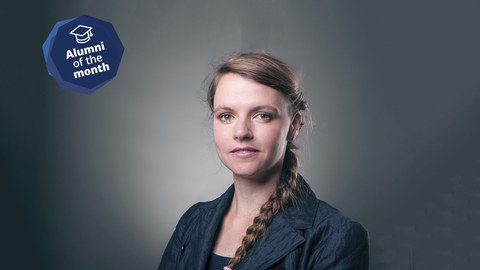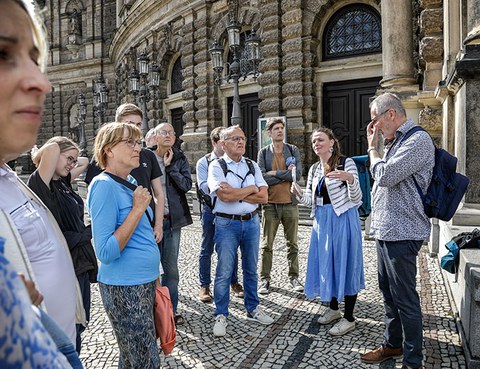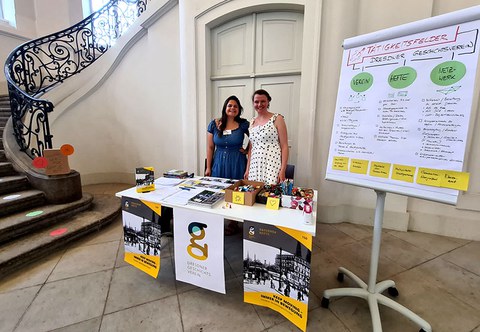Through knowledge, experience, contacts - and perseverance - to the dream job.
(interviewed in 2023)
Thomas Scheufler
Dr. Caroline Förster's professional career began with the desire to shoot historical documentaries. As Managing Director of the Dresden Historical Society, the Doctor of History and Communication Science is a brilliant expert when it comes to combining history, science and the media.
| Profile of | Dr. Caroline Förster |
| Degree program | Communication / Modern and Contemporary History |
| Faculty | Faculty of Arts, Humanities and Social Science |
| At the university | Master's Degree 2008, Doctorate Degree 2015 |
| Current work | Managing Director of the Dresden Historical Society |

Dr. Caroline Förster is Alumna of the Month July 2023.
Why did you decide to study at TU Dresden?
Dresden offered communication science in combination with history. I wanted that very much.
What made you chose this degree program?
I had worked at a radio station and really wanted to study. At that time, I was fascinated by media and history and wanted to make history documentaries for ZDF like Guido Knopp. Later on, I still wanted to convey history, for example by making films, but not in the way it is done on ZDF History. Science communication became my great passion during my studies.
Who from research and teaching influenced you the most during your studies?
Prof. Thomas Hänseroth and Prof. Josef Matzerath were both very important lecturers whom I am very, very grateful today. Both inspired, shaped and educated me in very different ways.
Where are you employed today, and what are your responsibilities?

Dr. Förster at the Conference "Anno 2023 Dresden in the crisis year of the Republic 1923".
Now, I am the Managing Director of the Dresden Historical Society and in this capacity I publish the Dresdner Hefte (Dresden booklets). The Society has over 250 members, was founded in 1869 and has been firmly anchored in the Dresden community since 1991. Thanks to our Dresdner Hefte booklets, events, network and expertise, we are an important player in the city's regional history and culture of remembrance. Most Dresdeners are familiar with the Dresdner Hefte, which are released four times a year; we are now at a total of 153 issues. My connections to TUD and its institutions continue to be close, because there are very strong links with the respective chairs and institutions through the Dresdner Hefte. Of course, there are also very close links through our editorial board. We also address students with our range of events. We are currently working with Professor Schötz and a small group of students on the topic of 1848/1849. We are closely connected with the SLUB through our digital projects for the Society in the area of CitizienScience. We transcribe publications of the Society in Wikisource in order for them to be searchable and findable. We are a fun little group of volunteers and staff who really enjoy digital history. By the way, I was also able to indulge in my radio passion again. I produced two episodes on the city's history for the podcast "Mit Herz und Haltung" ("With Heart and Attitude") of the Catholic Academy of the Diocese of Dresden-Meißen. Being back in the studio, talking and editing the recordings was so much fun that I'm thinking about developing my own format.
What advice would you give to our first-years?
I recommend to not merely work through the straightforward material, but also to look a little to the right and left of the path, to participate in volunteer projects, not only to collect credits, to try out something beyond the required standard. You usually meet great people and gain important experience. That's exactly what uni is all about.

Dr. Förster during a guided tour.
What do you remember most fondly about your time as a student?
About that time! Wonderful. Immersing yourself in a topic. Reading for as long as you want, then meeting people, discussing, having a party. I liked it. Maybe I picture it too rosy, but I liked the flexible time management and studying in the best sense. Discovering new worlds as the main task! A dream.
Was was your favorite place on campus?
It's hard to say: I often had lectures in August-Bebel-Strasse, everything was very ugly there and the toilets stank to high heaven at that time. The Alte Mensa canteen was nice, but far away from August-Bebel-Strasse. The office building at Zellerscher Weg was new, but very impersonal. When I had a lecture in a place where I had never been before, for example in the middle of campus in the Görges Building, I always thought it was very interesting because it felt venerable, but somehow remained exclusive to the engineers. The Café im Grünen already had the best coffee specialties in the morning, you also could sit comfortably, but since it used to be a prison, it didn't have what it takes to be a favorite place. That leaves only the reading room of the SLUB, quiet and timeless, it may well count as my favorite place then.
What still has a lot of value for you today/would you like to have had more of?
My entire studies were a very good preparation for my professional life. There were many opportunities, which I actively used. Especially in communication science, we had concrete practical insights with the exercises in practical work, which I really enjoyed and which gave me the tools of the trade. It was the same with the exercises, seminars and lectures in history, in which we dealt with concepts, but also concrete sources. What I would have liked to learn was some business management. That is part of any management responsibility and was not an issue at all in my studies. I acquired it in a different way.
What tips do you have for hitting the ground running in your industry?
I practically started my career during my studies: I was a student assistant in both history and communication studies. In addition, I worked at the theater part-time, and despite my scholarship, I began working in science communication as a freelance teacher in 2006. After completing my master's degree, I simply continued to work as a freelancer alongside my doctoral studies: on a book and an exhibition project and as a science communicator for the coordination office of the Dresden Science Night. These experiences and contacts have always helped me progress. Upon completion of my doctorate, I switched directly to a fixed-term employment contract and continued to work as a freelancer at the same time, which was a good thing. Basically, when you enter the professional world, it's all about the tools of the trade, of course. The more experience you have, the better. In science communication, but of course also now in my job as managing director, the following are the tools of the trade: Quick perception, generating concepts, project coordination, writing, copywriting, media experience, calculations. You need analytical thinking with a good dose of practical experience and pragmatism. I learned that during my studies, but even more during the many jobs and projects I've worked on. I repeat myself: it's so important to do internships, part-time jobs, small projects, and trying things out! Establish contacts in the field early on, be it in agencies or institutions. This will give you knowledge, experience and contacts, as well as an idea of what working in your chosen profession actually looks like.

At the museum night.
What connects you to TU Dresden today?
A lot. I studied, earned my doctorate and worked here. Even in my current job, I am closely connected with the alma mater and students through projects. The special offer of the Dresden Historical Society for young people, students is called #FetzigesGeschichtszeugs. With this offer we provide regular events, tours and exchange. Of course, students from TUD also participate. But you don't have to be a member of the Society to participate. (But it's worth it, because for only 15 euros you also get all four Dresden Hefte on the city's history). The connection to the university is very close, because in issue 154, for the first time, only students will write about Dresden's city history. That is completely new and exactly #FetzigesGeschichtszeugs.
Contact:
Dr. Caroline Förster
Managing Director of the Dresden Historical Society
